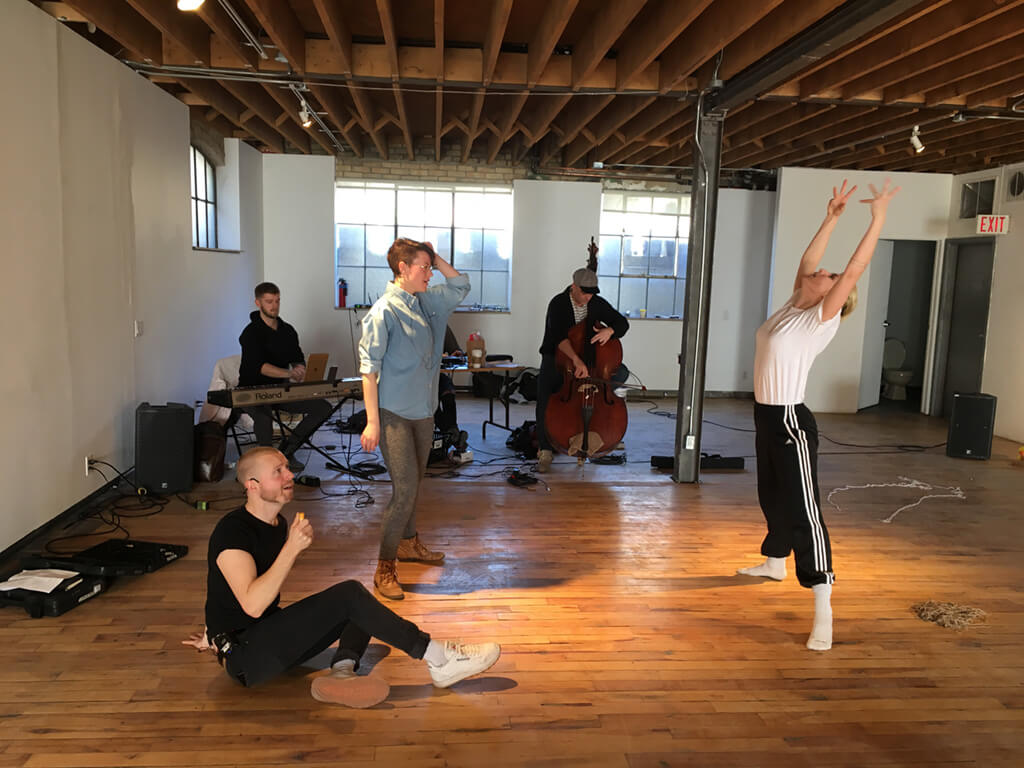
“Opera spelt backwards” is how tenor Jonathan MacArthur describes Belladonna – a queer techno opera, the latest experiment by Toronto indie opera company FAWN Chamber Creative. The new work is the brainchild of queer U.K. librettist Gareth Mattey, who met FAWN’s artistic director Amanda Smith at the Banff Opera program. Battling the concept of a composer-controlled work, the collective of artists, including modular synth artist Acote, composer/double-bassist Adam Scime, pianist Darren Creech, Jonathan MacArthur, guest mezzo-soprano Camille Rogers, and contemporary dancer Mary-Dora Bloch-Hansen, have worked together to create a truly queer work of art that changes with each performance.
Belladonna breaks away from the concept of a coherent narrative by “queering,” or breaking down, what we see as normal through a series of hallucinations had by two shepherds, Cloth and Lake. (Mattey literally breaks down the narrative by leaving gaps in the text meant for the performers to fill in!) Drawing inspiration from experimental music from 1960’s Graphic Scores, Mattey essentially collapses the hierarchical powers of the composer and gives new autonomy to the performers. As described, the libretto’s hallucinatory plot guides the way, but without a set of instructions for transitioning from one ‘world’ to another.
Mattey explains that this challenge to the role of author or creator is best achieved in opera, as its musical foundations support the unrealistic or surreal. To emphasize this in Belladonna, the vocal dimension is combined with techno music to fill in the gaps of Mattey’s libretto.fSin
Having seen only clips via Instagram, I was very curious to have Darren Creech fill me in on the musical creation of the work. Since Mattey returned to the U.K. in the middle of February, a lot of this has happened already — though this is not to say it wasn’t a co-creative process. Much of the music will be improvised by the musicians over top of a structure created by Acote. Creech described these structures as musical atmospheres in which the performers can fill in the gaps, paralleling the manner in which the singers will fill in the gaps of Mattey’s writing. It is in this flexible space that the performers are given the opportunity to explore their own identities on stage.
With the demand for improvisation in this piece, each performance is completely novel. As Creech described it, there is no longer the question of “Is this the right note? Am I playing this wrong?” Just as the performers have been exploring, constructing, and reconstructing the piece over the past month, they will again create a new experience the night of the performance. Because opera is fundamentally collaborative, there is perhaps nothing that could be queerer than breaking down the concept of a set work to be performed.
The premiere, Thursday, March 22, will perhaps be even more exciting than originally planned, as soprano Sarah Amelard has recently stepped in to replace MacArthur as Cloth. While this might at first appear as a simple substitution, it makes the performance even queerer because Amelard is a woman replacing a male performer. In fact, the replacement it highly fitting in this case as both Cloth and Lake are non-binary characters, (the only cis-gender character is the female dancer), and so Mattey’s vision is ironically fulfilled as we are reminded again that creator is not omnipotent.
Belladonna is (and will be) more than “opera spelt backwards.” Rather, it is spelt forwards, backwards, and forwards again. Just as MacArthur explained to me that Cloth is a re-exploration of the coming out story, the opera as a whole re-explores and reinterprets what it means to be queer, let alone what it means to perform opera.
For tickets to the performance on March 22nd at 56 Kensington Ave. Details here.



